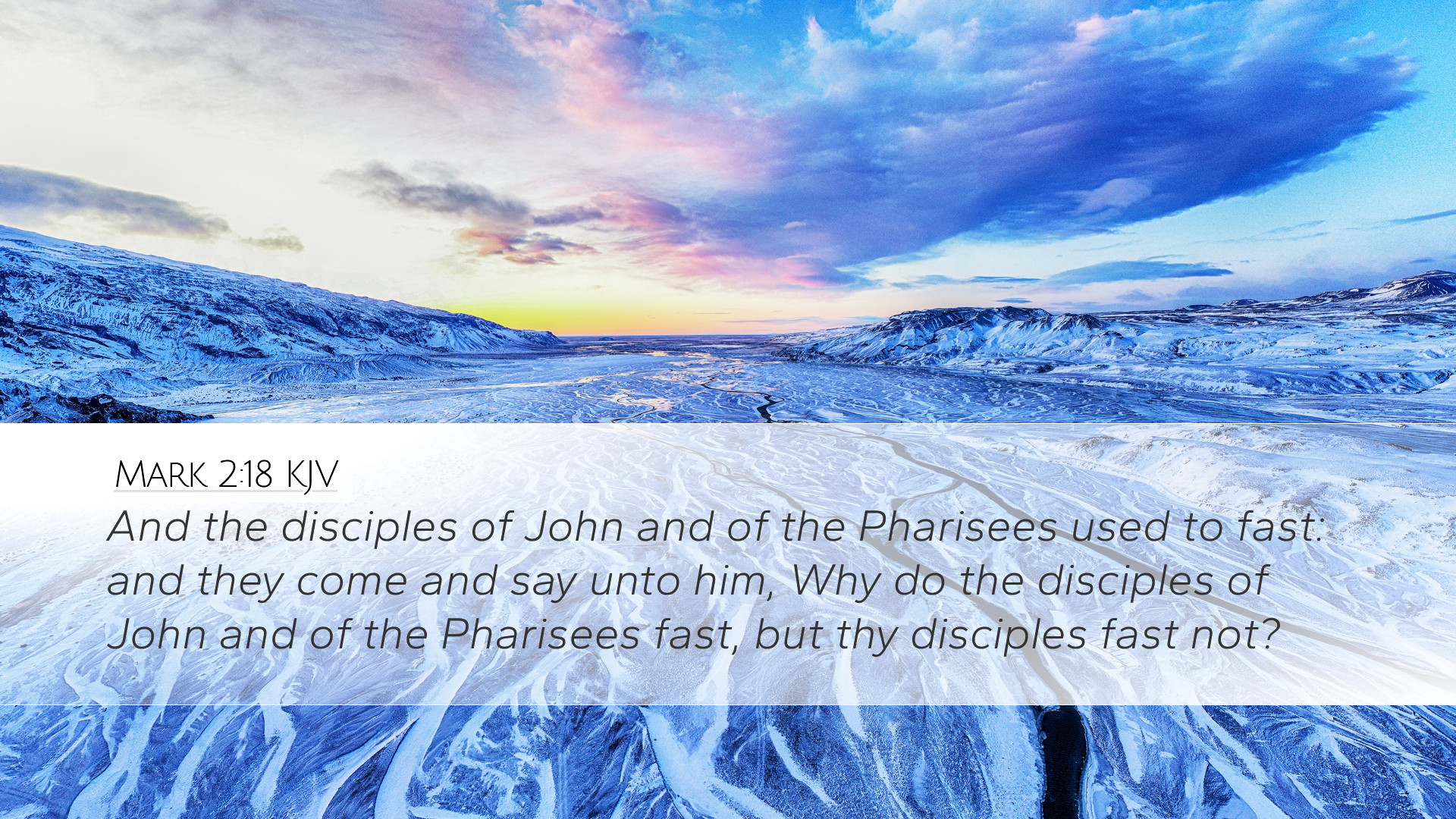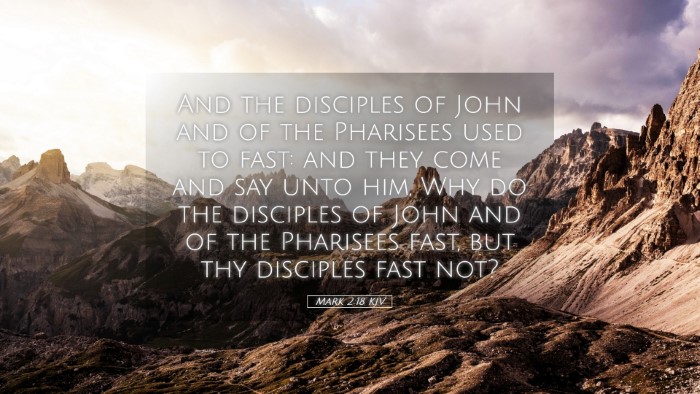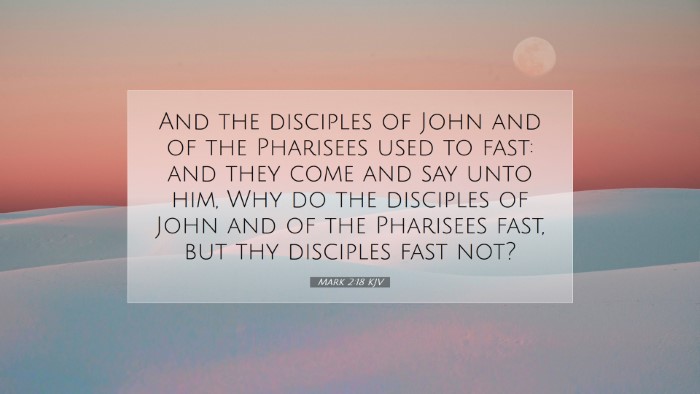Old Testament
Genesis Exodus Leviticus Numbers Deuteronomy Joshua Judges Ruth 1 Samuel 2 Samuel 1 Kings 2 Kings 1 Chronicles 2 Chronicles Ezra Nehemiah Esther Job Psalms Proverbs Ecclesiastes Song of Solomon Isaiah Jeremiah Lamentations Ezekiel Daniel Hosea Joel Amos Obadiah Jonah Micah Nahum Habakkuk Zephaniah Haggai Zechariah MalachiMark 2:18
Mark 2:18 KJV
And the disciples of John and of the Pharisees used to fast: and they come and say unto him, Why do the disciples of John and of the Pharisees fast, but thy disciples fast not?
Mark 2:18 Bible Commentary
Commentary on Mark 2:18
Mark 2:18: "And the disciples of John and of the Pharisees used to fast: and they come and say unto him, Why do the disciples of John and of the Pharisees fast, but thy disciples fast not?"
Introduction
This verse presents a significant moment in the ministry of Jesus where questions about fasting arise. It reflects on the practices of religious leaders and provides insight into the nature of true devotion and the coming of the Messiah. The context of fasting in the Jewish tradition, along with the activities of Jesus' disciples, sets the stage for a profound teaching.
Historical Context
Fasting in Jewish culture was associated with mourning, repentance, and religious observance. The Pharisees, known for their strict adherence to the Law, incorporated fasting into their religious practices, which often became a public display of piety. John's disciples, following his ascetic lifestyle, likewise adopted this practice. Thus, the contrast presented in Mark 2:18 underscores the evolving understanding of religious observance with the advent of Christ.
Insights from Matthew Henry
Matthew Henry emphasizes the inquiry by John's disciples as representing a common misunderstanding of Jesus' mission. He notes that their concern about the lack of fasting among Jesus’ followers highlights a failure to recognize the context of joy brought by Christ’s presence. Henry argues that Christian joy and celebration often supersede ceremonial fasting, particularly in this era of salvation history.
- Joy in Christ: Henry infers that the disciples of Jesus were in a time of celebration, indicative of the New Covenant where joy in the presence of the Bridegroom is paramount.
- Carnal vs. Spiritual Understanding: He contrasts the carnal perception of righteousness, as seen in the Pharisees, with the spiritual realization that comes with a relationship with Christ.
Insights from Albert Barnes
Albert Barnes approaches Mark 2:18 with a focus on the criticism leveled at Jesus. He explains that fasting was a significant part of religious life, and the question posed reflects skepticism towards the different practices observed by Jesus' followers. Barnes asserts that this dialogue serves to clarify the purpose of fasting in light of the significance of Jesus’ ministry.
- Purpose of Fasting: Barnes points out that fasting is beneficial when it serves a purpose tied to repentance or a message from God, rather than being a mere ritual.
- Presence of Christ: He argues that the presence of Christ is cause for joy, which would naturally mitigate the need for fasting at that moment.
Insights from Adam Clarke
Adam Clarke offers a nuanced perspective on the concept of fasting as portrayed in this passage. He suggests that the question from the disciples of John and the Pharisees signals a lack of understanding of Jesus’ mission and the new covenant established through Him. Clarke elaborates on the implications of fasting, relating it to spiritual discipline rather than mere formalism.
- Spiritual Discipline: Clarke posits that while fasting can be a valid expression of devotion, it should not overshadow the importance of what Jesus represents.
- Evolving Practices: He notes that the practices of Judaism were being transformed by Jesus, and the rigid observance of the Law was giving way to a more profound spiritual experience.
Theological Implications
The dialogue surrounding fasting encourages Christians to examine their own practices of devotion. The joy found in Christ supersedes ritualistic practices, which may lead to a lifeless religion. Mark 2:18 challenges believers to discern the true nature of biblical fasting—grounded not merely in tradition but in deep relational engagement with God.
- Celebration vs. Ritual: The passage calls for a celebration of faith, suggesting that traditions need to be evaluated in light of Jesus’ transformative work.
- Nature of True Worship: True worship is characterized by a heart aligned with God’s purposes rather than following imposed external requirements.
Conclusion
Mark 2:18 serves as a profound reminder of the implications of Jesus' ministry on traditional Jewish practices. The challenge posed by the question of fasting invites an introspective examination of why and how believers engage with their faith. As pastors, theologians, and scholars reflect on this scripture, it is essential to focus on the transformative joys of the Gospel, inviting all to embrace the radical grace found in the presence of Christ.


